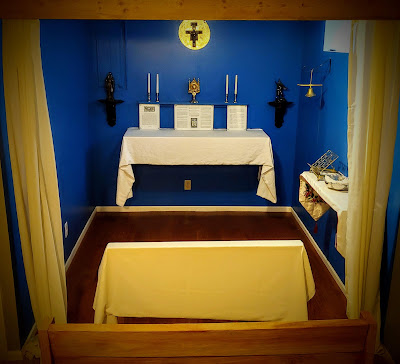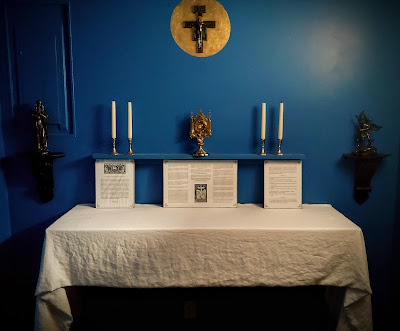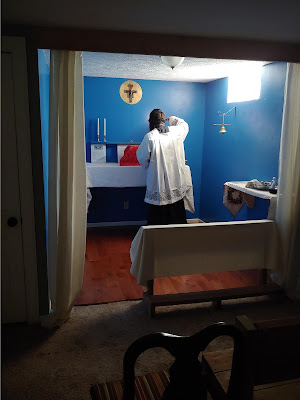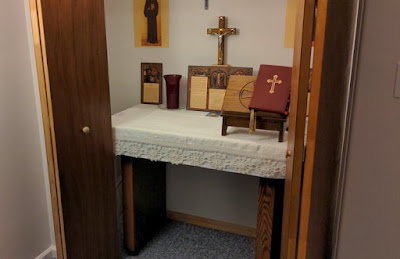In Uncertain Times, House Chapels Proliferate
While some house chapels of the aforementioned sort are still in existence and functional, it is becoming more common to see modest chapels being built in the homes of ordinary Catholic laity. A basement renovation, a small spare room, an attic, all offer possibilities for building an altar and setting up a space that is appropriate for the Mass and other devotions in a time of necessity. Some families simply wish to create a prayerful space where they can gather for individual or group prayer, in an environment that reminds them of and connects them with the parish or chapel where they usually go for Mass. Others, keenly aware of the grave and deteriorating situation in which the Church finds itself in the West, have decided to "plan ahead" by making a suitable space for eventual underground or "canceled" priests. One diocese has already outlawed private traditional Masses altogether, and there may be more that follow suit. Priests in such dioceses will benefit from having places of refuge where they can bypass the unjust restrictions and offer Mass to God, in the presence of grateful laity.
In January, I published an article at NLM called "Building a Home Altar," which offered practical advice about specs that could be used for an altar, as well as some other desiderata. Afterwards I received some interesting photographs, a selection of which I wish to share for the edification and inspiration of readers who may be thinking along similar lines.
The first set of photos is of a lovely chapel in a basement. The family has plans for further decoration.
Finally, an unusual item to share from a priest, who is in a pastoral situation where saying the old Mass is risky. He has fitted out a closet as a "side altar," which can then be closed and hidden at any other time.
Some readers may be inclined to scoff or raise eyebrows at Masses held in homes, as if it is a thing that should not be done. They would be right in this sense: in ideal circumstances, every parish church, every cathedral, every basilica, should be breathing the sacred silence of the Low Mass and should be ringing with the sounds of Gregorian chant and the pipe organ at the Missa cantata and the Missa solemnis. But that is not where we are—not even remotely. And in a time of growing hostility to the tradition of the Church, our patrimony must be preserved and handed on. In the 1970s, there were plenty of Masses in hotels and living rooms: that is a large part of the reason we have the traditional Mass today in churches and cathedrals. Fr. James Jackson writes in the Acknowledgments of his book Nothing Superfluous: "I thank Mr. Alan Hicks, who invited me to Dr. Senior's home for a Low Mass, celebrated with great love by the late Fr. Harry Marchowski. It was the first time I was the ancient rite of the Mass. Though a living room is no basilica, there was a perfect devotion there" (p. xvi).
Robert Hugh Benson's historical novel set in the reign of Queen Elizabeth, By What Authority?, furnishes the best fictional treatment of a secret Mass in a home of which I am aware. One of the principal characters, a Puritan lady named Isabel, who has become intimate friends with a Catholic recusant family and is drawn to their faith, experiences her first Mass, said by a priest who has been racked multiple times and who has nonetheless escaped with his life. Given the extremely dangerous circumstances, it has to take place in the middle of the night, in the living room of the manor. Here is the excerpt: it is one of the finest descriptions of the Holy Mass in all of English literature.
* * *
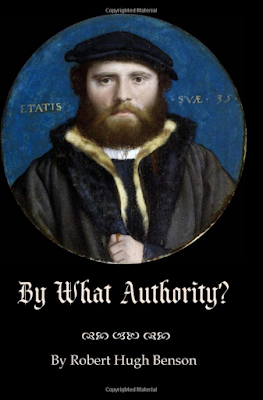 |
| Cover of the Os Justi Press edition |
The chapel at Maxwell Hall was in the cloister wing; but a stranger visiting the house would never have suspected it. Opening out of Lady Maxwell's new sitting-room was a little lobby or landing, about four yards square, lighted from above; at the further end of it was the door into her bedroom. This lobby was scarcely more than a broad passage; and would attract no attention from any passing through it. The only piece of furniture in it was a great tall old chest as high as a table, that stood against the inner wall beyond which was the long gallery that looked down upon the cloister garden. The lobby appeared to be practically as broad as the two rooms on either side of it; but this was effected by the outer wall being made to bulge a little; and the inner wall being thinner than inside the two living-rooms. The deception was further increased by the two living-rooms being first wainscoted and then hung with thick tapestry; while the lobby was bare. A curious person who should look in the chest would find there only an old dress and a few pieces of stuff. This lobby, however, was the chapel; and through the chest was the entrance to one of the priest's hiding holes, where also the altar-stone and the ornaments and the vestments were kept. The bottom of the chest was in reality hinged in such a way that it would fall, on the proper pressure being applied in two places at once, sufficiently to allow the side of the chest against the wall to be pushed aside, which in turn gave entrance to a little space some two yards long by a yard wide; and here were kept all the necessaries for divine worship; with room besides for a couple of men at least to be hidden away. There was also a way from this hole on to the roof, but it was a difficult and dangerous way; and was only to be used in case of extreme necessity.
It was in this lobby that Isabel found herself the next morning kneeling and waiting for mass. She had been awakened by Mistress Margaret shortly before four o'clock and told in a whisper to dress herself in the dark; for it was impossible under the circumstances to tell whether the house was not watched; and a light seen from outside might conceivably cause trouble and disturbance. So she had dressed herself and come down from her room along the passages, so familiar during the day, so sombre and suggestive now in the black morning with but one shaded light placed at the angles. Other figures were stealing along too; but she could not tell who they were in the gloom. Then she had come through the little sitting-room where the scene of last night had taken place and into the lobby beyond.
But the whole place was transformed.
Over the old chest now hung a picture, that usually was in Lady Maxwell's room, of the Blessed Mother and her holy Child, in a great carved frame of some black wood. The chest had become an altar: Isabel could see the slight elevation in the middle of the long white linen cloth where the altar-stone lay, and upon that again, at the left corner, a pile of linen and silk. Upon the altar at the back stood two slender silver candlesticks with burning tapers in them; and a silver crucifix between them. The carved wooden panels, representing the sacrifice of Isaac on the one half and the offering of Melchisedech on the other, served instead of an embroidered altar-frontal. Against the side wall stood a little white-covered folding table with the cruets and other necessaries upon it. There were two or three benches across the rest of the lobby; and at these were kneeling a dozen or more persons, motionless, their faces downcast. There was a little wind such as blows before the dawn moaning gently outside; and within was a slight draught that made the taper flames lean over now and then.
Isabel took her place beside Mistress Margaret at the front bench; and as she knelt forward she noticed a space left beyond her for Lady Maxwell. A moment later there came slow and painful steps through the sitting-room, and Lady Maxwell came in very slowly with her son leaning on her arm and on a stick. There was a silence so profound that it seemed to Isabel as if all had stopped breathing. She could only hear the slow plunging pulse of her own heart.
James took his mother across the altar to her place, and left her there, bowing to her; and then went up to the altar to vest. As he reached it and paused, a servant slipped out and received the stick from him. The priest made the sign of the cross, and took up the amice from the vestments that lay folded on the altar. He was already in his cassock.
Isabel watched each movement with a deep agonising interest; he was so frail and broken, so bent in his figure, so slow and feeble in his movements. He made an attempt to raise the amice but could not, and turned slightly; and the man from behind stepped up again and lifted it for him. Then he helped him with each of the vestments, lifted the alb over his head and tenderly drew the bandaged hands through the sleeves; knit the girdle round him; gave him the stole to kiss and then placed it over his neck and crossed the ends beneath the girdle and adjusted the amice; then he placed the maniple on his left arm, but so tenderly! and lastly, lifted the great red chasuble and dropped it over his head and straightened it—and there stood the priest as he had stood last Sunday, in crimson vestments again; but bowed and thin-faced now.
Then he began the preparation with the servant who knelt beside him in his ordinary livery, as server; and Isabel heard the murmur of the Latin words for the first time. Then he stepped up to the altar, bent slowly and kissed it and the mass began.
Isabel had a missal, lent to her by Mistress Margaret; but she hardly looked at it; so intent was she on that crimson figure and his strange movements and his low broken voice. It was unlike anything that she had ever imagined worship to be. Public worship to her had meant hitherto one of two things—either sitting under a minister and having the word applied to her soul in the sacrament of the pulpit; or else the saying of prayers by the minister aloud and distinctly and with expression, so that the intellect could follow the words, and assent with a hearty Amen. The minister was a minister to man of the Word of God, an interpreter of His gospel to man.
But here was a worship unlike all this in almost every detail. The priest was addressing God, not man; therefore he did so in a low voice, and in a tongue as Campion had said on the scaffold "that they both understood." It was comparatively unimportant whether man followed it word for word, for (and here the second radical difference lay) the point of the worship for the people lay, not in an intellectual apprehension of the words, but in a voluntary assent to and participation in the supreme act to which the words were indeed necessary but subordinate. It was the thing that was done, not the words that were said, that was mighty with God. Here, as these Catholics round Isabel at any rate understood it, and as she too began to perceive it too, though dimly and obscurely, was the sublime mystery of the Cross presented to God. As He looked down well pleased into the silence and darkness of Calvary, and saw there the act accomplished by which the world was redeemed, so here (this handful of disciples believed), He looked down into the silence and twilight of this little lobby, and saw that same mystery accomplished at the hands of one who in virtue of his participation in the priesthood of the Son of God was empowered to pronounce these heart-shaking words by which the Body that hung on Calvary, and the Blood that dripped from it there, were again spread before His eyes, under the forms of bread and wine. Much of this faith of course was still dark to Isabel; but yet she understood enough; and when the murmur of the priest died to a throbbing silence, and the worshippers sank in yet more profound adoration, and then with terrible effort and a quick gasp or two of pain, those wrenched bandaged hands rose trembling in the air with Something that glimmered white between them; the Puritan girl too drooped her head, and lifted up her heart, and entreated the Most High and most Merciful to look down on the Mystery of Redemption accomplished on earth; and for the sake of the Well-Beloved to send down His Grace on the Catholic Church; to strengthen and save the living; to give rest and peace to the dead; and especially to remember her dear brother Anthony, and Hubert whom she loved; and Mistress Margaret and Lady Maxwell, and this faithful household: and the poor battered man before her, who, not only as a priest was made like to the Eternal Priest, but as a victim too had hung upon a prostrate cross, fastened by hands and feet; thus bearing on his body for all to see the marks of the Lord Jesus.
Lady Maxwell and Mistress Margaret both rose and stepped forward after the Priest's Communion, and received from those wounded hands the Broken Body of the Lord.
And then the mass was presently over; and the server stepped forward again to assist the priest to unvest, himself lifting each vestment off, for Father Maxwell was terribly exhausted by now, and laying it on the altar. Then he helped him to a little footstool in front of him, for him to kneel and make his thanksgiving. Isabel looked with an odd wonder at the server; he was the man that she knew so well, who opened the door for her, and waited at table; but now a strange dignity rested on him as he moved confidently and reverently about the awful altar, and touched the vestments that even to her Puritan eyes shone with new sanctity. It startled her to think of the hidden Catholic life of this house—of these servants who loved and were familiar with mysteries that she had been taught to dread and distrust, but before which she too now was to bow her being in faith and adoration.
After a minute or two, Mistress Margaret touched Isabel on the arm and beckoned to her to come up to the altar, which she began immediately to strip of its ornaments and cloth, having first lit another candle on one of the benches. Isabel helped her in this with a trembling dread, as all the others except Lady Maxwell and her son were now gone out silently; and presently the picture was down, and leaning against the wall; the ornaments and sacred vessels packed away in their box, with the vestments and linen in another. Then together they lifted off the heavy altar stone. Mistress Margaret next laid back the lid of the chest; and put her hands within, and presently Isabel saw the back of the chest fall back, apparently into the wall. Mistress Margaret then beckoned to Isabel to climb into the chest and go through; she did so without much difficulty, and found herself in the little room behind. There was a stool or two and some shelves against the wall, with a plate or two upon them and one or two tools. She received the boxes handed through, and followed Mistress Margaret's instructions as to where to place them; and when all was done, she slipped back again through the chest into the lobby.
The priest and his mother were still in their places, motionless. Mistress Margaret closed the chest inside and out, beckoned Isabel into the sitting-room and closed the door behind them. Then she threw her arms round the girl and kissed her again and again.
"My own darling," said the nun, with tears in her eyes. "God bless you—your first mass. Oh! I have prayed for this. And you know all our secrets now. Now go to your room, and to bed again. It is only a little after five. You shall see him—James—before he goes. God bless you, my dear!"
She watched Isabel down the passage; and then turned back again to where the other two were still kneeling, to make her own thanksgiving.
Isabel went to her room as one in a dream. She was soon in bed again, but could not sleep; the vision of that strange worship she had assisted at; the pictorial details of it, the glow of the two candles on the shoulders of the crimson chasuble as the priest bent to kiss the altar or to adore; the bowed head of the server at his side; the picture overhead with the Mother and her downcast eyes, and the radiant Child stepping from her knees to bless the world—all this burned on the darkness. With the least effort of imagination too she could recall the steady murmur of the unfamiliar words; hear the rustle of the silken vestment; the stirrings and breathings of the worshippers in the little room.
Then in endless course the intellectual side of it all began to present itself. She had assisted at what the Government called a crime; it was for that—that collection of strange but surely at least innocent things—actions, words, material objects—that men and women of the same flesh and blood as herself were ready to die; and for which others equally of one nature with herself were ready to put them to death. It was the mass—the mass—she had seen—she repeated the word to herself, so sinister, so suggestive, so mighty. Then she began to think again—if indeed it is possible to say that she had ever ceased to think of him—of Anthony, who would be so much horrified if he knew; of Hubert, who had renounced this wonderful worship, and all, she feared, for love of her—and above all of her father, who had regarded it with such repugnance:—yes, thought Isabel, but he knows all now. Then she thought of Mistress Margaret again. After all, the nun had a spiritual life which in intensity and purity surpassed any she had ever experienced or even imagined; and yet the heart of it all was the mass. She thought of the old wrinkled quiet face when she came back to breakfast at the Dower House: she had soon learnt to read from that face whether mass had been said that morning or not at the Hall. And Mistress Margaret was only one of thousands to whom this little set of actions half seen and words half heard, wrought and said by a man in a curious dress, were more precious than all meditation and prayer put together. Could the vast superstructure of prayer and effort and aspiration rest upon a piece of empty folly such as children or savages might invent?
Then very naturally, as she began now to get quieter and less excited, she passed on to the spiritual side of it. Had that indeed happened that Mistress Margaret believed—that the very Body and Blood of her own dear Saviour, Jesus Christ, had in virtue of His own clear promise—His own clear promise!—become present there under the hands of His priest? Was it, indeed,—this half-hour action,—the most august mystery of time, the Lamb eternally slain, presenting Himself and His Death before the Throne in a tremendous and bloodless Sacrifice—so august that the very angels can only worship it afar off and cannot perform it?
